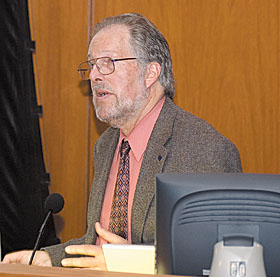  |
| HOME | THIS ISSUE | CALENDAR | GRANTS | BACK ISSUES | < BACK | NEXT > |
International scientific panel confirms global warming crisis, says speakerby Elizabeth Omara-Otunnu - April 2, 2007 | ||||
| In the field of climate change, grim assessments and dire predictions are nothing new. But a report by a UN agency reflects widespread international consensus that the assessments are supported by scientific evidence, and leaves little room for skepticism, according to climate change expert Richard Somerville. Somerville, a Distinguished Professor at Scripps Institution of Oceanography at the University of California, San Diego, was one of the scientists who developed the Intergovernmental Panel on Climate Change’s latest report, which was finalized in February. The IPCC assesses the science currently available on climate change and makes it available to policy makers around the world. During a presentation at the Dodd Center on March 22, part of the Teale Lecture Series on Nature and the Environment, Somerville gave an outline of the IPCC’s report, which will be published in May. He said global warming is no longer in doubt, and it is largely due to manmade causes. “Access to abundant cheap fossil fuel on which our prosperity is largely based has brought us a Faustian bargain,” he said. “We have great economic and societal benefits, but they come at a steep environmental price, and that calls for tough decisions.” He described the IPCC as “incredibly professional and thorough.” The report’s conclusions were reached by consensus among hundreds of scientists, and take into account thousands of review comments, he said, while the summary for policy makers was worded by representatives of about 100 governments worldwide, with oversight by the scientists to ensure the integrity of the scientific content. “In a technical field where wise policy ought to be informed by sound science, this is the best description we have of what the science is today,” said Somerville, one of the report’s 152 lead authors. Based on analysis of climate evolution from 1850 to the present, he said, including observed increases in global average air and ocean temperatures, widespread melting of snow and ice, and rising global average sea level, the IPCC concluded that “warming of the climate system is unequivocal.” He said the IPCC analyzed two computer models of global warming, one in which the only input is natural, the other taking into account the man-made growth in carbon dioxide and other gases. There is “ overwhelming evidence,” Somerville said, “that mankind is changing the chemical composition of the atmosphere in ways that make the greenhouse effect that’s naturally present into a more effective blanket for trapping heat.” He said carbon dioxide accounts for half the growth in greenhouse gases. One in four carbon dioxide molecules in the air is man-made, coming primarily from burning fossil fuels. “The very rapid rises in carbon dioxide levels we know unequivocally are man-made,” he said. “Carbon dioxide from chimneys and tailpipes has a different isotopic signature from natural sources, so we can pin down the source without any difficulty.” Somerville said “headline statements” in the IPCC’s four reports to date are becoming stronger.
A report published in 1995 stated, “The balance of evidence suggests a discernible human influence on global climate.” A statement crafted this year, however, pronounced that “Most of the observed increase in globally averaged temperatures since the mid-20th century is very likely due to the observed increase in anthropogenic greenhouse gas concentrations.” “Very likely” in the parlance of the intellectually cautious IPCC, he explained, means “with 90 percent certainty or more.” The increase of carbon dioxide in the atmosphere is an international problem, he said. Carbon dioxide stays in the atmosphere for a time stretching from decades to several centuries, and is distributed by the wind. “The carbon dioxide above Storrs now was put into the atmosphere by billions of people all over the world over a long period of time,” he said. Possible future climate scenarios, drawn up by the IPCC based on computer simulations, include at one extreme “business as usual” – a scenario in which people continue to do what their parents did, and emissions continue to rise as the population rises, he said. Then there are various alternative scenarios in which attempts would be made to limit the amount of greenhouse gases. But even in a scenario in which “we could somehow magically fix carbon dioxide and other greenhouse gases,” Somerville said, global warming will continue to some extent because of inertia in the climate system. Depending on the scenario, he said, “which essentially boils down to the rate at which we emit greenhouse gases into the atmosphere,” temperatures could rise by up to 5 degrees Celsius. “That’s about the difference between an ice age and an interglacial climate like the present.” Whatever climate strategies are adopted, however, the picture won’t alter much for the next two decades, he said. “That’s why the geopolitics of this is so difficult … you’re asking the political and business worlds to take actions now whose effects won’t become apparent until some years down the road.” Somerville alluded several times to claims – now diminishing in number – that global warming is a hoax. The IPCC report refutes those claims, he said. “The science is convincing.” The choice that faces the world today, he said, is to take action, or to do nothing and wait for nature to prove the predictions right. |
| ADVANCE HOME UCONN HOME |

